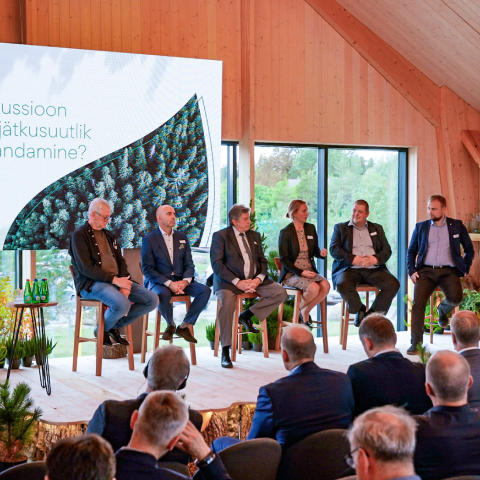8Developing future solutions
In 2022, two projects were in the focus of VKG’s development activities: the establishment of a bioproducts production complex (BPC) in the rural municipality of Lüganuse and the plastic waste pyrolysis project.
Adding value to wood
The development of the BPC project in this stage mainly means supporting the designated special plan process initiated in the Lüganuse rural municipality. In the first stage of the designated spatial plan process, suitable locations for the complex were analysed and two alternatives were proposed. Hendrikson & KO, the preparer of the designated spatial plan, drew up the draft pre-selection of the location on the basis of the studies and analyses performed, as well as the report of the first stage of the Strategic Assessment of Environmental Impact (SAEI). The designated spatial plan process moves on planned schedule and the first stage report should be approved in the Lüganuse rural municipality in the summer of 2023.
As the availability of pulpwood is critical for the BPC project and may be significantly affected by the Forestry Development Plan (FDP), we actively provided input to the FDP drafters to reflect the need to recycle pulpwood and wood chips in Estonia and not export unrefined wood to Scandinavia. In 2022, the Estonian University of Life Sciences carried out a study on the availability of wood resources for the BPC project, which showed that the resource availability would be sufficient even if the annual volume of harvested wood falls to 10 million cubic metres.
More about the project
vkg.ee/biotooted


VKG ENVIRONMENTAL DAY 2022: THE POTENTIAL AND PROSPECTS FOR THE VALORISATION OF ESTONIAN FORESTS
Last year, the VKG Environmental Day was dedicated to our new development area – adding value to wood. We are convinced that the planned bioproducts production complex in the Lüganuse rural municipality is a very necessary step to move away from the dependence on exporting and burning wood resources that are not used in Estonia, to enable the substitution of fossil raw materials and to bring new economic activities and jobs to the region.
The Environmental Day brought together scientists, environmental experts, policy makers and politicians to discuss the possibilities of adding value to one of Estonia’s largest natural resources, wood.
The raw material requirement of the proposed production complex is 2 to 2.3 million cubic metres of pine, spruce and birch pulpwood per year. In comparison, Estonian logging generates more than 5 million cubic metres per year of raw material suitable for the pulp industry, which is exported as raw material, burned with energy wood or sold cheaply without much value added. VKG’s main interest is to develop further processing of soluble pulp, the end products of which are used in the textile and biochemical industries, as well as in the paint, food and pharmaceutical industries. The largest application is in the viscose fabric industry, but the range of needs and opportunities is broad and the replacement of fossil raw materials by biochemicals is being developed in virtually every sector of the economy. In addition, the complex would produce an additional 730 gigawatt-hours of renewable electricity, more than half of which would be fed into the grid, supporting energy security in Estonia. The planning phase of the production complex is from 2021 to 2024. The construction of the plant is expected to take place between 2025 and 2026, with start-up in 2027.
Recycling of plastic waste
The development of the plastic waste pyrolysis project started in 2022 in cooperation with Kiviõli Keemiatööstuse Oil OÜ and the project is also supported by the Business and Innovation Agency through its applied research programme.

During the development phase of the project, laboratory studies were carried out at the TalTech Department of Energy Technology and initial tests were carried out in the laboratory of Enefit Outotec Technology OÜ in Frankfurt. In addition, the companies independently carried out a study on the availability of plastic waste. In the course of the project, VKG came to the realisation that solutions for pyrolysis of plastic waste already existed in the world and therefore withdrew from the original new technology development project. KKT Oil will continue with the original project independently.
VKG has initiated a plastic waste recycling project based on the initial project, which aims to use the already operating plastic waste chemical recycling technology and to build a plant as soon as possible. The new approach will process plastic waste, mainly collected in Estonia, into pyrolysis oil that can be sold to petrochemical companies to be recycled into new plastic. In this way, up to 75% of the plastic waste can be recycled, thus allowing the production of new plastic.
